Overview
- Credit Line
- United States Holocaust Memorial Museum Collection, Gift of Carol Perlman
Physical Details
- Classification
-
Personal Equipment and Supplies
- Object Type
-
Combs (lcsh)
- Physical Description
- Black comb.
Rights & Restrictions
- Conditions on Access
- No restrictions on access
- Conditions on Use
- No restrictions on use
Administrative Notes
- Legal Status
- Permanent Collection
- Provenance
- The comb was donated to the United States Holocaust Memorial Museum in 2002 by Carol Perlman.
- Record last modified:
- 2023-09-27 16:22:31
- This page:
- https://collections.ushmm.org/search/catalog/irn47976
Download & Licensing
In-Person Research
- By Appointment
- Request 21 Days in Advance of Visit
- Plan a Research Visit
- Request to See This Object
Contact Us
Also in Frances Ziegler family collection
The collection consists of two armbands, cloth bundle, two combs, earmuff, klaf, knife, scissors, scrip, tag, documents, photographs, and books relating to the experiences of Frances Ziegler before and during the Holocaust in Poland where she lived in hiding in Poland and after the Holocaust in Fohrenwald displaced persons camp.
Date: 1916-1982
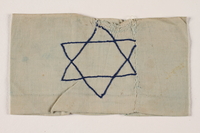
Armband with an embroidered blue Star of David worn in the Bobrka ghetto
Object
Armband worn by the Ziegler family while in the Bobrka Ghetto.
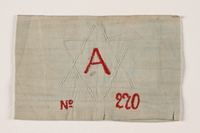
Armband with an embroidered white Star of David worn in the Bobrka ghetto
Object
Armband worn by the Ziegler family while in the Bobrka Ghetto.
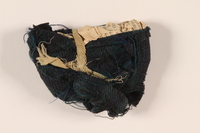
Fabric bundle
Object
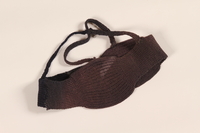
Knitted blue earmuff
Object
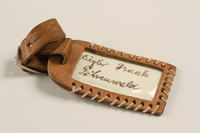
Tag
Object
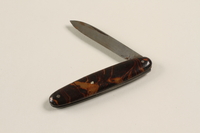
Knife
Object
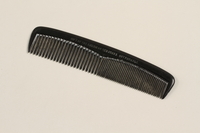
Comb
Object
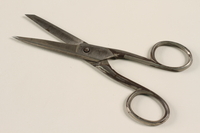
Commercial scissors
Object
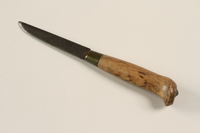
Knife
Object
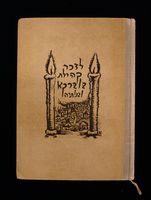
Memorial book
Object
Ziegler family papers
Document
The collection documents the Holocaust-era experiences of the Ziegler family, originally of Bóbrka, Poland (Bóbrka, Ukraine), including their time spend hidden in a cellar on a farm in Lanki, Poland, post-war life in the Föhrenwald displaced persons camp, and their immigration to the United States in 1949. Included are documents, photographs, a notebook, and scrip from the Łódź ghetto. Documents include pre-war records such identification papers, a report card, and a marriage certificate and Ketubah; a certificate from the Bóbrka Landkommissar allowing the Ziegler family to live outside of the Bóbrka ghetto; post-war documents from the Föhrenwald DP camp, ORT papers, immigration paperwork, and reparations documents. Photographs include pre-war depictions of the family in Bóbrka, and post-war depictions in Föhrenwald and the United States. Also included is a notebook with textile patterns belonging to Frieda Ziegler used while studying in the ORT program in Föhrenwald.
Book
Object




